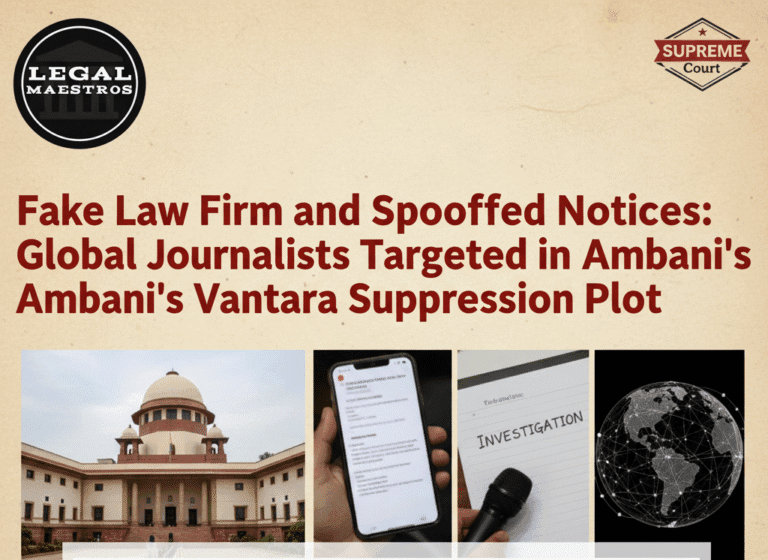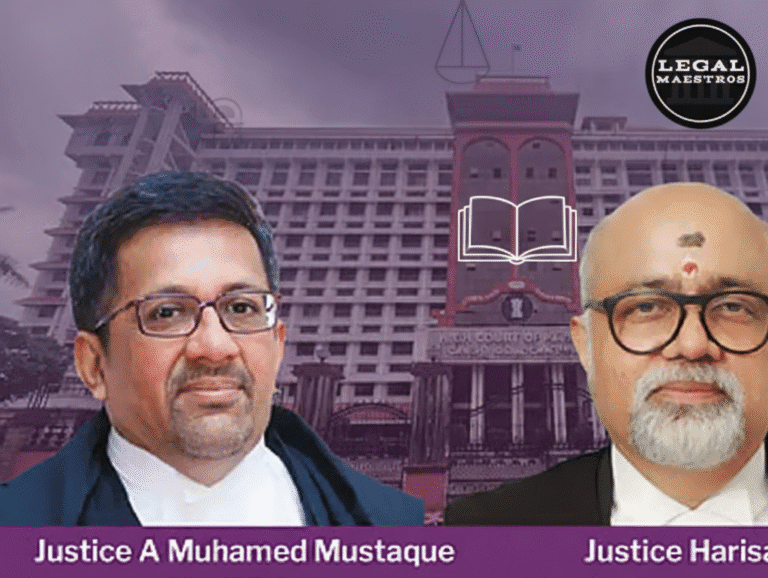
In every civilized society, justice is built on truth. The legal system relies on honest testimony, accurate information, and lawful conduct by individuals, especially when it comes to court proceedings and matters of public interest. The Bharatiya Nyaya Sanhita, 2023, which replaces the colonial-era Indian Penal Code, addresses this need for truthfulness under Section 227, titled “Giving False Evidence.” This section plays a crucial role in ensuring that justice is not distorted or delayed due to falsehoods.
What Does Section 227 Say?
Section 227 of the Bharatiya Nyaya Sanhita, 2023, states that:
For any queries or to publish an article or post or advertisement on our platform, do call at +91 6377460764 or email us at contact@legalmaestros.com.
If a person is legally required—either by oath or by a provision of law—to tell the truth or make a declaration, and he knowingly makes a false statement, or states something without believing it to be true, he is said to give false evidence.
There are two explanations attached to this section:
- A statement can be verbal (spoken) or non-verbal (written or otherwise). It is still false evidence if it’s knowingly false.
- Even if someone falsely says they believe something, when in fact they do not believe it, that too is considered false evidence. This means a lie about what someone claims to believe is just as serious as a lie about what someone claims to know.
Why Is This Section Important?
For any queries or to publish an article or post or advertisement on our platform, do call at +91 6377460764 or email us at contact@legalmaestros.com.
The justice system depends on honest and truthful statements. If people lie while giving statements or evidence in legal matters, innocent people may suffer, and guilty people may escape punishment. That is why the law takes false evidence very seriously. Section 227 ensures that people cannot take advantage of the legal system by lying under oath or in legal declarations.
When Does This Law Apply?
This law applies in situations where a person is:
For any queries or to publish an article or post or advertisement on our platform, do call at +91 6377460764 or email us at contact@legalmaestros.com.
- Under oath to tell the truth (for example, during a trial or court proceeding),
- Required by law to make a truthful declaration (like affidavits, official statements, etc.),
- Making any statement that he or she knows is false or does not believe to be true.
It does not matter whether the statement is spoken, written, signed, or communicated in any other way. If it is false and the person knows it or does not believe it to be true, then it is considered false evidence.
Simple Examples to Understand Section 227
To understand this better, let us look at a few illustrations based on real-life-like situations. These examples will show when a person is guilty of giving false evidence and when they are not.
For any queries or to publish an article or post or advertisement on our platform, do call at +91 6377460764 or email us at contact@legalmaestros.com.
Example 1: Lying in Court
Suppose A is called as a witness in a court case between B and Z. B has a genuine claim that Z owes him ₹1,000. To help B, A falsely swears that he heard Z admitting to owing the money, even though A never heard any such thing. This is a lie told under oath. A has given false evidence and can be punished under Section 227.
Example 2: Lying About a Belief
For any queries or to publish an article or post or advertisement on our platform, do call at +91 6377460764 or email us at contact@legalmaestros.com.
Suppose A is asked to identify a signature and is under oath. He says he believes that the signature belongs to Z, even though he knows that it is not Z’s handwriting. Since A does not actually believe it, and yet says he does, this is false evidence.
Example 3: Honest Mistake Is Not a Crime
Now let’s imagine another situation. A knows how Z generally signs documents. One day he sees a signature and believes, in good faith, that it looks like Z’s handwriting. He says this honestly in court. Later it is found that the signature was not Z’s. But A genuinely believed it was. Here, A has not given false evidence because he did not knowingly lie. He told the truth about what he believed.
For any queries or to publish an article or post or advertisement on our platform, do call at +91 6377460764 or email us at contact@legalmaestros.com.
Example 4: Making Statements Without Any Knowledge
Suppose A, under oath, says that he knows Z was at a certain place on a certain day. But in reality, A knows nothing about Z’s whereabouts. Even if it later turns out Z was actually there, A still gave false evidence because he made a statement about something he did not know.
Example 5: Translating or Interpreting Falsely
For any queries or to publish an article or post or advertisement on our platform, do call at +91 6377460764 or email us at contact@legalmaestros.com.
Let’s say A is a translator in a court. He is required to translate a witness’s statement correctly. But A knowingly gives a wrong translation or interpretation of what was said. Even though he is not the one giving evidence directly, he has still given false evidence because the court relied on his translation.
Who Can Be Punished Under Section 227?
Anyone who is:
For any queries or to publish an article or post or advertisement on our platform, do call at +91 6377460764 or email us at contact@legalmaestros.com.
- A witness in a court case,
- A person making an affidavit or declaration,
- An interpreter, translator, or any person bound to give truthful and accurate statements,
- Or even someone outside court, making a false declaration required by law.
In all these cases, if the person knowingly lies or makes a statement without believing it to be true, he or she is liable for punishment under Section 227.
What Is Not Considered False Evidence?
Sometimes people make honest mistakes. As in the earlier example, if a person genuinely believes something to be true and says it under oath, it is not false evidence—even if that belief turns out to be incorrect later. The key factor is intention. If a person did not intend to lie or deceive and was simply mistaken, the law does not punish them.
For any queries or to publish an article or post or advertisement on our platform, do call at +91 6377460764 or email us at contact@legalmaestros.com.
Similarly, if a person guesses or assumes something without pretending to be certain, it may not count as false evidence. The law looks at what the person actually knew or believed at the time of making the statement.
Section 227 of the Bharatiya Nyaya Sanhita, 2023 is a vital provision to ensure that people speak the truth when the law requires them to. Giving false evidence can cause serious harm to innocent people and damage the credibility of the justice system. This section makes it clear that if someone knowingly makes a false statement when legally required to be truthful, they are committing a serious offence.
For any queries or to publish an article or post or advertisement on our platform, do call at +91 6377460764 or email us at contact@legalmaestros.com.
The law does not punish people for making honest mistakes or expressing genuine beliefs, but it comes down heavily on those who lie intentionally. The goal is to maintain fairness, honesty, and integrity in the legal system. By understanding this section and its implications, citizens can contribute to the proper functioning of the justice system and avoid serious legal consequences.






![Research Assistantship @ Sahibnoor Singh Sindhu, [Remote; Stipend of Rs. 7.5k; Dec 2025 & Jan 2026]: Apply by Nov 14, 2025!](https://legalmaestros.com/wp-content/uploads/2025/11/Gemini_Generated_Image_s0k4u6s0k4u6s0k4-768x707.png)
![Karanjawala & Co Hiring Freshers for Legal Counsel [Immediate Joining; Full Time Position in Delhi]: Apply Now!](https://legalmaestros.com/wp-content/uploads/2025/11/Gemini_Generated_Image_52f8mg52f8mg52f8-768x711.png)
1 thought on “Section 227 of the Bharatiya Nyaya Sanhita, 2023: False Evidence and Public Justice”